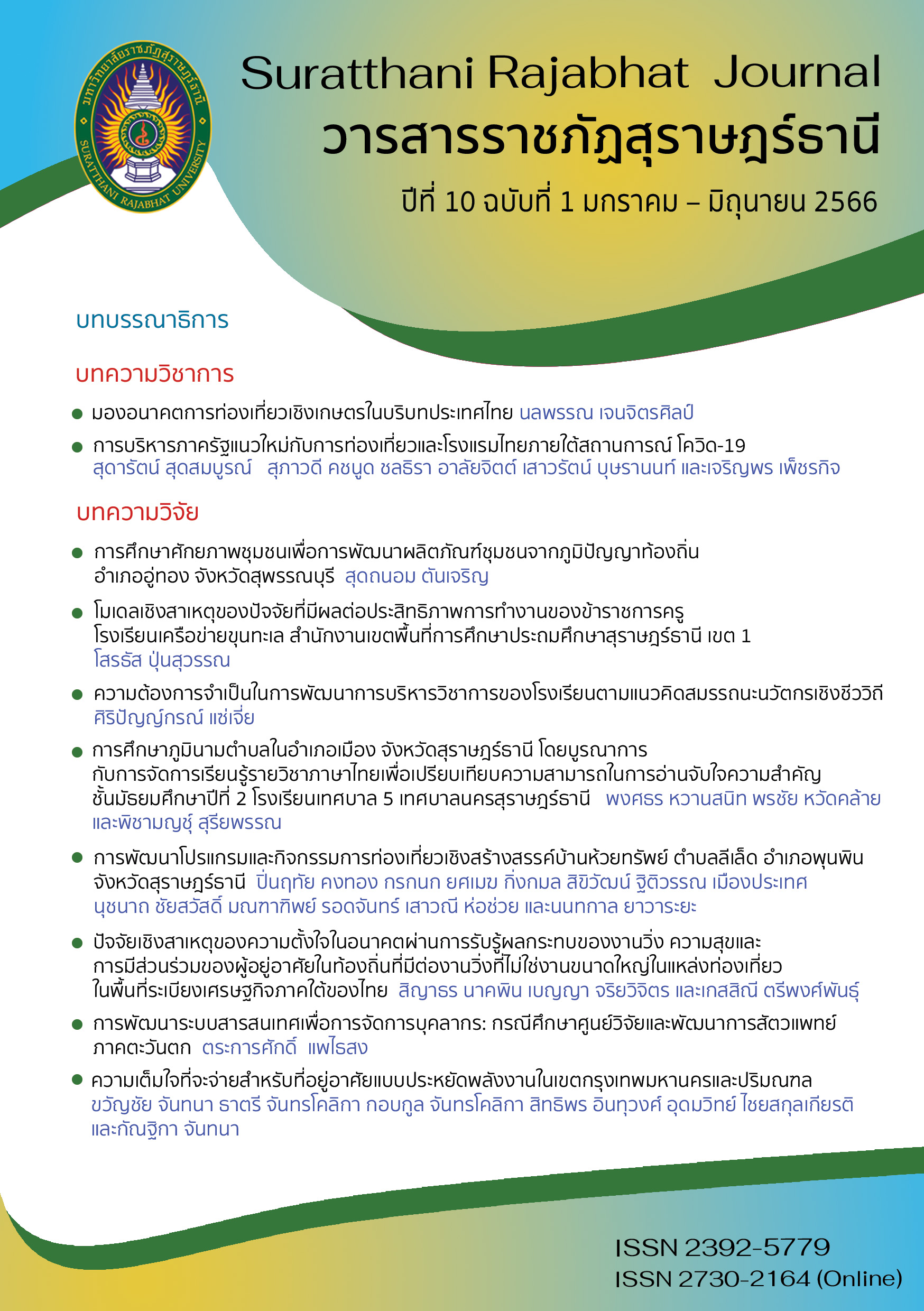A Casual Model of Factors Affecting the Performance of Teachers in Khun Thale School Network Under Suratthani Primary Educational Service Area Office 1
Main Article Content
Abstract
The objectives of the study were to 1) study the factors that influence the job performance and 2) determine and test the concordance between the hypothesis model and the empirical factors concerning positive thinking, a happiness organization, organizational engagement and perceived support from the organization which were influenced on the operational efficiency. The sample group in this research were 124 government teachers from network schools in Khun Thale Sub-district under Surat Thani Primary Educational Service Area Office 1. The research instrument used for data analysis was a rating-scale questionnaire. The statistics were descriptive statistics, frequency, percentage, mean, standard deviation, Pearson Product Moment correlation coefficient, and liner structural model.
The results of this study were that the factors positive thinking , happiness organization , organizational engagement and perceived support from the organization influenced the operational efficiency. 2) After modify the causal model has congruence with the empirical data (Chi-Square = 464.50, df = 422, P-Value = 0.3814 , X2 / df = 1.101, CFI = 0.977, TLI = 0.975 , RMSEA = 0.038) The model accounted for 60.90 % of the variance in the operational efficiency.
Article Details

This work is licensed under a Creative Commons Attribution-NonCommercial-NoDerivatives 4.0 International License.
References
Bowonasavakul, K., (2020). Enhancing the quality of life and working happily. http://tpso4.msociety.go.th/index.php/th/tpso-news/2017-05-16-15-16-27/43-happy-workplace-8.
Chen, C. (2020). The Effect of Leader Knowledge Hiding on Employee Voice Behavior - The Role of Leader-Member Exchange and Knowledge Distance. Open Journal of Social Sciences, 8(4), 42-51. https://www.researchgate.net/publication/340508809_The_Effect_of_Leader_Knowledge_Hiding_on_Employee_Voice_Behavior-The_Role_of_Leader-Member_Exchange_and_Knowledge_Distance.
Indrakerd, M. & Jestalaksana, W. (2017). Influence of Perceived Organization Support and Perceived Supervisor support toward Job Performance of Employee in The Private University, 8(2), 129-144.
Ingard, A. (2022). Determining an Appropriate Sample Size and Power of Test with Strength Degree of the Relationship between Variables in theStructural Equation Modeling. MUT Journal of Business Administration, 19(1), 106-121. https://so04.tci-thaijo.org/index.php/journalmbsmut/article/view/259623.
Kaeodumkoeng, K. & Junhasobhaga, J. (2018). Effects of Happy Workplace Program in Companies of Thai Garment Industry. PSAKU International Journal of Interdisciplinary Research, 7(1), 52-61. https://so05.tci-thaijo.org/index.php/PSAKUIJIR/article/download/217882/1509801699600.
Lexcharoen, S. & Klomklieng, P. (2022). Causal Factors Affecting Loyalty in Purchasing Products Through The Makro Application in Bangkok and Its Vicinity. Journal of Arts Management, 6(3), 1250–1265. https://so02.tci-thaijo.org/index.php/jam/article/view/255626.
Office Of The BMA Civil Service Commission. (2017). “Report of the loss of government teachers and educational personnel”, 1-25.
Phuwittayaphan, A. (2018). Competency Assessment Tool. (1st edition). Bangkok: HR Center.
Prachumthong V., & Wongrat, K. (2019). Performance Competency of Heads of Production Line and Organizational Effectiveness of Canned Fruit Juice Production Companies in Prachuap Khiri Khan Province. Research and Development Journal, 9(2), 136-151. https://so05.tci-thaijo.org/index.php/irdssru/article/view/214232/149107.
Ruggeri, K., Garcia-Garzon, E., Maguire, Á., Matz, S. & Huppert, F.A. (2020). Well-being is more than happiness and life satisfaction : A multidimensional analysis of 21 countries. Health and Quality of Life Outcomes, 18, 192. https://hqlo.biomedcentral.com/articles/10.1186/s12955-020-01423-y.
Srithiphan, P., Chaleerak, W., Phanthong, W. & Suksawang, P. (2017). Factors Affecting Positive Thinking in the Work of Government Teachers and Educational Personnel: MIMIC Analysis. Veridian E-Journal, 9(1), 1336-1348. https://www.researchgate.net/publication/305031624_Factors_affecting_positive_thinking_in_the_work_of_teachers_And_education_personnel_MIMIC_analysis.
Supannopaph, P. (2018). Positive Thinking : Life Development Variable. Veridian E-Journal, Silpakorn University, 11(3), 1958-1978. https://he02.tci-thaijo.org/index.php/Veridian-E-Journal/article/view/158967.
Sutthirak, S. & Leadkaew, S. (2021). Structural Equation Model of Factors Influencing Performance of Community Enterprises. Journal of Social Science and Buddhistic Anthropology, 6(8), 431-447. https://so04.tci-thaijo.org/index.php/JSBA/article/view/250880.
Thanchaikorn, A. (2019). Organizational commitment The close-relation in organizational according. Journal of Roi Kaensarn, 4(1), 32-45. https://so02.tci-thaijo.org/index.php/JRKSA/article/view/246209/166345.
Thongbai, K., & Pinprayong, B. (2022). Members Participation Model of Cluster Business Management: A under The Federation of Thai Industry. Modern Management Journal, 20(1), 33–45. https://so04.tci-thaijo.org/index.php/stou-sms-pr/article/view/249180.
Tripongpun, K. (2022). Confirmatory Factor analysis of tourism safety for foreign female tourists. Suratthani Rajabhat Journal, 9(1), 40-75. https://so05.tci-thaijo.org/index.php/srj/article/view/253876/174660.
U-senyang, S. (2022). Ethical Leadership: Factors Affecting Happiness Organizations. Faculty of Management Sciences, Princess of Naradhiwas University.


